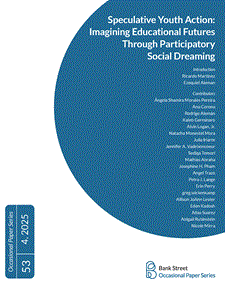The Occasional Paper Series, published twice yearly, is a forum for work that extends, deepens and challenges the progressive legacy on which Bank Street College is built. The series seeks to promote discussion about what it means to educate in a democracy and to meet the interrelated demands of equity and excellence.
The series is a peer-reviewed, open access journal that subscribes to the Creative Commons Attribution-NonCommercial-NoDerivatives 4.0 International Public License CC BY-NC-ND license.

Current Issue: Number 53
(2025)
Speculative Youth Participatory Action Research: Narratives of Imaginative Social Dreaming
Full Issue
Articles
Introduction: Speculative Youth Participatory Action Research: Narratives of Imaginative Social Dreaming
Ricardo Martinez and Ezequiel Aleman
Así querés que aprenda: Artivism as a Speculative Praxis
Ángela Shamira Morales Pereira, Ana Corona, and Rodrigo Aleman
Actualizing Black Spatial Histories Through a Speculative Youth Archiving Project
Kaleb Germinaro and Alvin Logan, Jr.
Social Imagining in “Youth Taking Action:” Documenting Immigrating and Settling Through a Hybrid Youth Participatory Action Research Project
Natacha Monestel Mora, Julia Iriarte, Jennifer A. Vadeboncoeur, Sediqa Temori, and Mathias Abraha
“I’ll Walk Out if You Walk Out”: A Comic on How Students of Color Utilize Racial Micropolitical Literacy in Their Everyday Lives
Josephine Pham and Talitha Angelica Acaylar Trazo
Crawl Spaces to Productive Ruptures: A Reflection to Remember Speculative Futures
Petra J. Lange, Erin Perry, and gregory wickenkamp
Transforming Futures Through Speculative YPAR: The Garage Story
Allison JoAnn Lester, Eden Kadosh, Atlas Suarez, and Abigail Rubinstein

Guest Editors
- Ricardo Martinez
- Ezequiel Aleman

Ricardo Martinez is an assistant professor at Pennsylvania State University, where he works to create ontological playgrounds of liberation—spaces where youth, teachers, community members, and faculty can empower themselves. His interdisciplinary research is situated in critical youth studies and becomes whatever the youth want and need the research to be. As a poet, Ricardo is passionate about exploring poetry as a qualitative method and works to highlight poetry as a praxis to enhance mathematical teaching and learning .

Ezequiel Aleman is a director at Universidad Tecnológica in Uruguay and an assistant professor in the Department of Innovation and Entrepreneurship where he leads a college access program for rural youth. His research explores the participatory design of learning experiences that serve as spaces for youth to make sense of their lived experiences in relation to digital technologies and their place-based relationships.